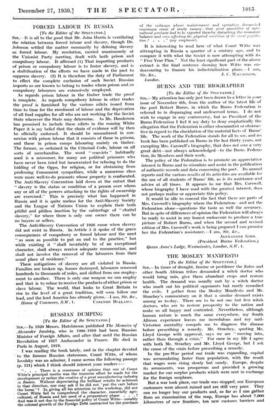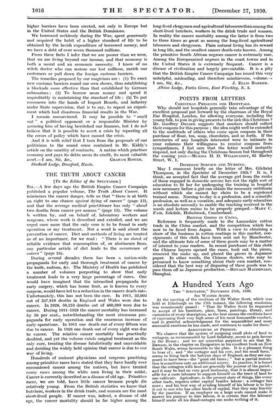THE MOSLEY MANIFESTO [To the Editor of the SPECTATOR.]
Sin,—In times of drought, famine or pestilence the Zulus and other South African tribes demanded a witch doctor who would bring rain, give them abundant crops and restore health. The demand was usually met by a witch doctor who smelt out his political opponents but rarely remedied the evils. I gather from the Mosley Manifesto and Mr.
Strachey's commentary on it that a lar demand exists among us to-day. There are to be not one but live witch doctors, who are to restore prosperity to the nation and make us all happy and contented. Nevertheless, although human nature is much the same everywhere, my South African experience leaves me incredulous and my mid- Victorian mentality compels me to diagnose the disease before prescribing a remedy. Mr. Strachey. quoting Mr. Lloyd George with approval, says we are " moving into, rather than through a crisis." For once in my life I agree with both Mr. Strachey and Mr. Lloyd George, but I ask the cause of the crisis before prescribing a remedy.
In the pre-War period our trade was expanding, capital was accumulating faster than population, with the result that wages were rising slowly but surely. Europe, despite its armaments, was prosperous and provided a growing market for our surplus products which were sent in exchange for the foreign surpluses.
But a war took place, our trade was stopped, our European customers were almost ruined and are still very poor. They can no longer buy our products and, so far as I can gather from an examination of the map, Europe has about 7,000 kilometres of new frontiers, ten new customs barriers and higher barriers have been erected, not only in Europe but in the United States and the British Dominions.
We borrowed recklessly during the War, spent generously and acquired the habit of a higher standard of life to be obtained by the lavish expenditure of borrowed money, and we have a debt of over seven thousand millions.
From these facts I infer that we are poorer than we were, that we are living beyond our income, and that economy is both a moral and an economic necessity. I know of no witch doctor who can restore our lost millions, enrich our customers or pull down the foreign customs barriers.
The remedies proposed by our magicians are : (1) To erect new customs barriers round our own shores, thus establishing a blockade more effective than that established by German submarines ; (2) To borrow more money and spend it unprofitably in maintaining the standard of life ; (3) To put commerce into the hands of Import Boards, and industry under State supervision, that is to say, to repeat an experi- ment which had disastrous financial results in the War.
I remain unconvinced. It may be possible to " smell out " a political opponent or a responsible Minister by accusing him of having bewitched our finances, but I do not believe that it is possible to avert a crisis by repeating all the errors of policy which have caused the crisis.
And it is with relief that I turn from the proposals of our politicians to the sound sense contained in Mr. Kiddy's article on the sanctity of contracts. A nation which practises economy and pays its debts saves its credit, its most valuable
asset.—I am, Sir, &c., GRAHAM BOWER. Studied' Lodge, Droxford, Hants.



































 Previous page
Previous page